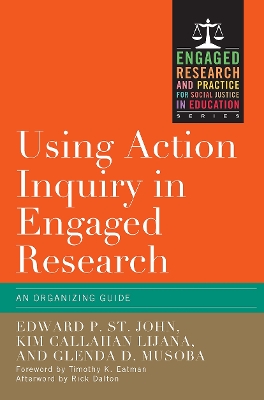Engaged Research and Practice for Social Justice in Education
1 total work
Using Action Inquiry in Engaged Research
by Edward P. St. John, Kim Lijana, and Glenda Musoba
Published 30 January 2017
Using Action Inquiry in Engaged Research: A Professional Guide offers higher education and school professionals practical guidance and methods for using the Action Inquiry Model (AIM) in engaged research initiatives and community partnerships. Replete with group exercises and case studies, this guide was originally developed to supplement workshops for faculty, administrators and students working on action initiatives that focused on critical educational issues facing local communities. It provides a useful framework and straightforward techniques for building empowering partnerships.
The Action Inquiry Model (AIM) includes four stages:
The Action Inquiry Model (AIM) includes four stages:
- Assessment: Using research and experience to identify critical challenges facing the university with respect to the improvement of educational opportunities
- Organization: Developing workgroups to collaborate on initiatives that address critical challenges; providing financial support for new initiatives; and providing release time and professional development opportunities for faculty and staff who engage in reform initiatives
- Action Initiatives: Treating reforms as pilot tests for new strategies, as a means of promoting organizational learning, professional development, and student success
- Evaluation: Integrating the evaluation of current programs and incorporating new initiatives into the reform process.
